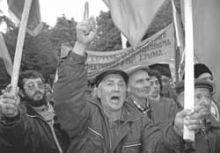October 17 witnessed two events at practically at the same place, which only seemed unconnected. A session took place in parliament and Crimean Tatars staged a meeting in front of the Supreme Council. Contrary to established practice, when a meeting would be over in an hour, two at the most, and a session would last several days, that Wednesday the session lasted thirty minutes, a record in Crimean political history, and as lawmakers left the premises through side doors, the meeting, numbering over a thousand Crimean Tatars, was in full swing. One of the posters read, “Hrach Destabilizes Peace in the Crimea.” People were demanding normal life in their historical homeland.
While the meeting followed a more or less traditional course, the session in parliament was an altogether different story. In the audience, moods changed in a manner no one would have predicted or thought possible. A pro-cabinet majority had again begun to take shape. Its adherents, dissatisfied with Leonid Hrach’s performance, had resolved not to attend the session. Chairman of the Council of Ministers Valery Horbatov was present, but most deputies with ministerial portfolios and supporting factions never turned up. Before the session was called to order most seats in the audience remained empty and the electronic billboard showed 38-39 lawmakers registered. All 11 points on the agenda were considered in half an hour, of which the most important one, the 2001 (sic) budget bill and the program of the accommodation and sociocultural development of deportees, also for 2001, were deferred for revision. November 17 was the date on which both the budget and program were to have been fulfilled.
As the legislators left building through side doors, the Crimean Tatars on the cordoned-off square started chanting “Deputies, out on the square!” But the people’s choices pretended not to hear. Instead, Vice Speaker Borys Deitch appeared before the crowd and the meeting elected deputies for talks. A resolution was adopted, reading that the ethnic tensions in the Crimea are mounting due to “further isolation of the Crimean Tatars from actual participation in representative bodies and executive authorities,” that the people is experiencing “unbearable hardships and shortages in conditions of mass unemployment, lack of proper support, living in unfinished buildings and townships without any infrastructures. The morbidity and death rate among the Crimean Tatars is considerably higher than the Crimean average,” and so on.
That day the Crimea obviously crossed a Rubicon of sorts. At one time Leonid Hrach succeeded in toppling Serhiy Kunitsyn and replacing him by Valery Horbatov. Under the circumstances, he thought he had the cabinet fully under control. But now the tables seem to have turned. The government, made up of those same lawmakers, is again protesting, albeit by walkout, against his intentions and modus operandi. Could something be wrong with the Crimean Parliament?







